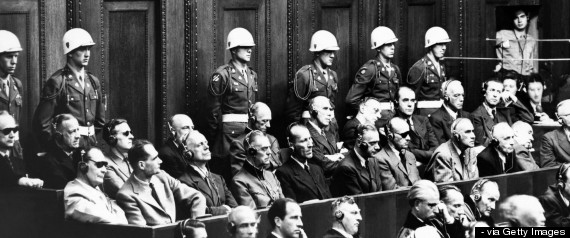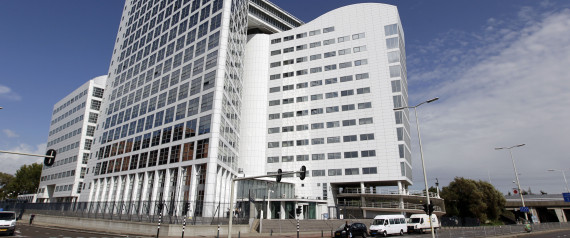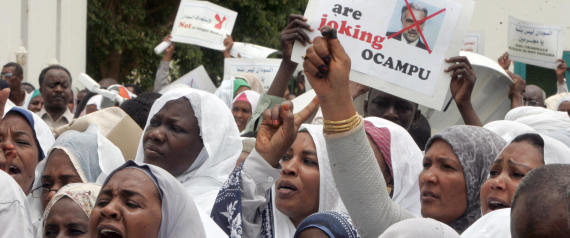
Israeli Prime Minister Benjamin Netanyahu accused the militant group Hamas this month of committing a "double war crime" for targeting Israeli civilians with rockets and using the Gaza Strip's residents as "human shields." Palestinian officials, meanwhile, argued that Israel should be charged with war crimes for the "crime of apartheid," ''attacks against civilians," ''excessive loss of human life" and the "crime of colonization." And Navi Pillay, the United Nations' human rights commissioner, said that the downing of a Malaysia Airlines flight over eastern Ukraine may amount to a war crime.
But what exactly constitutes a war crime?
As the BBC explains, war crimes are "among the gravest crimes in international law" and stem from the idea that "individuals can be held criminally responsible for the actions of a country or its soldiers."

The concept of a war crime has evolved since World War I and II.
Throughout the 20th century, there were several attempts to prosecute individuals accused of crimes during war. At the end of World War I, the Allies attempted to extradite and convict German Kaiser William II, breaking the precedent that heads of state were exempt from prosecution. At the end of World War II, 22 Nazis and 25 Japanese defendants were tried for war crimes in the Nuremberg and Tokyo trials.
In 1949, a series of conferences led to the expansion of the Geneva Conventions, treaties that established international standards of warfare. The term "war criminal" thereafter referred to an individual found guilty of breaking those global standards.
However, the next prosecution of war crimes didn't take place until 1993, when international tribunals were created to address the horrors of the wars in Yugoslavia and Rwanda. It was against this backdrop that the international community recognized the need for a permanent and independent body to rule on war crimes, which led to the creation of the International Criminal Court (ICC) in 2002.

The ICC is located in The Hague and is guided by the Rome Statute, a document that outlines the categories of war crimes and the prosecution process for someone charged with committing -- or planning to commit -- a war crime. It is considered a "court of last resort" for cases that cannot be solved in a national court.
In addition to genocide, there are three kinds of crimes that can qualify as a war crime. The BBC summarizes:
- Aggression, also known as "crimes against peace," which involves planning or waging a war in violation of international agreements
- Conventional war crimes, which include murder, torture and destruction of property
- Crimes against humanity, including political, racial or religious persecution of civilians
As of May 2013, 122 nations had signed the treaty to join the ICC. Three powerful countries -- the United States, Russia and China -- have refused to ratify it. And many governments with terrible track records, like North Korea and Zimbabwe, are not members. Any member state, as well as the United Nations Security Council and the ICC's Office of the Prosecutor, can bring a case before the court.

Political and military leaders from around the world have faced accusations of war crimes, but only in a few cases has a complaint been brought before the ICC. And even then, the prosecution rate is low: Since the ICC's inception in 2002, it has only handled 21 cases, even though it had received 10,470 "communications" (such as official complaints and referrals) by the end of 2013.
In 2012, the Kuala Lumpur War Crimes Commission convicted (in absentia) former President George W. Bush, former Vice President Dick Cheney and a handful of other members of the Bush administration of "torture and cruel, inhumane and degrading treatment" committed in places like the Abu Ghraib and Guantanamo prisons. The Kuala Lumpur commission subsequently forwarded the case to the ICC. However, the court has not prosecuted the cases, partly because the U.S. is outside of the ICC's jurisdiction.
Among the first cases the court did pursue focused on Democratic Republic of Congo warlord Thomas Lubanga, who was was convicted of abducting and recruiting children to use as child soldiers. The court sentenced Lubanga to 14 years in prison in 2012.

As Human Rights Watch explains, the ICC faces numerous challenges: It has a large investigative caseload, receives variable support from governments and has been unable to take custody of several suspects.
For example, Sudanese leader Omar al-Bashir, who is charged with genocide and war crimes in Darfur, has eluded the ICC's grasp. The court's inability to bring him to justice underscores the difficulty of taking alleged criminals into custody unless a local government hands them over.
The ICC has also come under fire for its actions. Many columnists and professors say it spends too much money -- nearly $900 million since it was founded, according to the BBC. The court has also faced criticism for focusing its agenda on Africa. Those who defend it point out that only African countries have brought cases before the ICC, whereas other cases have been brought by the United Nations Security Council.

Given the ICC's track record and the obstacles it faces (not least of which is the question of jurisdiction), it is unlikely that much will come out of this month's allegations in Israel, Gaza and Ukraine. As atrocities tragically continue to take place, accusations of war crimes may amount to little more than rhetoric.
Mattia Toaldo, a policy fellow at the European Council on Foreign Relations, recently told the Associated Press that Palestinian officials' accusations against Israel may be more of a symbolic gesture. "I'd be surprised if The Hague accepts the complaint," he said.
Correction: An earlier version of this post erroneously stated that the ICC tried Charles Taylor for war crimes. While the ICC hosted the trial, the Special Court for Sierra Leone actually prosecuted the case.
